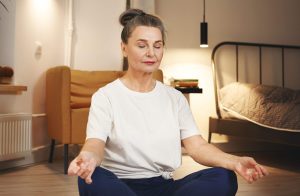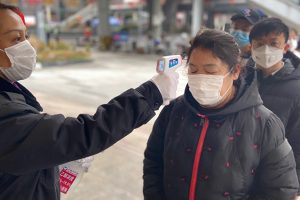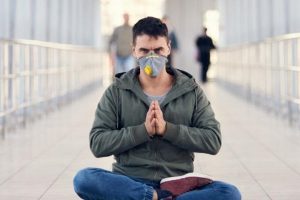Improve Well-Being During Covid-19 Lockdown with Yoga and Meditation
By John M. de Castro, Ph.D.
“Practicing mindfulness and meditation may help you manage stress and high blood pressure, sleep better, feel more balanced and connected, and even lower your risk of heart disease.” American Heart Association
The Covid-19 pandemic has challenged the mental and physical health of the population. It has created intense stress both for frontline workers but also for people simply isolating at home. Mindfulness training has been shown to improve health and well-being in healthy individuals and those with medical and psychiatric conditions, Similarly, yoga practice has been shown to improve health and well-being in healthy individuals and those with medical and psychiatric conditions. Meditation practice is known to decrease the psychological and physical responses to stress. Similarly, yoga practice has been shown to decrease the psychological and physical responses to stress. So, mindfulness and yoga practices may be helpful in coping with the mental and physical challenges resulting from the Covid-19 pandemic and lockdown.
In today’s Research News article “A cross–sectional study of mental wellbeing with practice of yoga and meditation during Covid-19 pandemic.” (See summary below or view the full text of the study at: https://www.ncbi.nlm.nih.gov/pmc/articles/PMC8144767/ ) Priyanka and colleagues recruited adults over the internet during the Covid-19 pandemic lockdown and had them complete a questionnaire measuring yoga practice, meditation practice, mental well-being, change in eating and sleeping, and the effects of the lockdown on mental health. The participants were separated into 4 groups, yoga only (18%), meditation only (21%), meditation plus yoga (35%), and no yoga or meditation.
They found that normal well-being scores were present in 66% of participants who practiced both yoga and meditation, 62% of those practicing meditation only, 60% of those practicing yoga only and 50.6% of people who practiced none. They also found that the greater the number of years practicing and the more frequent the practice the greater the proportion of participants with normal well-being scores. A similar association of yoga and meditation practices was found with the change in eating, sleeping pattern, and family relations.
These results are correlational and as such caution must be exercised in concluding causation. But it has been previously shown that contemplative practices improve well-being, sleep, eating, and family relations. So, it is likely that the present results are due to yoga and meditation producing these benefits. The results, then, suggest that practicing yoga and meditation help to maintain mental well-being during a stressful pandemic lockdown and practicing both produces optimum benefits. They also suggest that the greater the frequency of practice and years practicing the greater the benefits. This suggests that practicing yoga and meditation help to relieve stress during difficult times, improving overall well-being.
So, improve well-being during Covid-19 lockdown with yoga and meditation.
“mindfulness meditation is related to improved mental health across a variety of disorders, including different anxiety disorders, depression, eating disorders, substance abuse, and chronic pain symptom reduction.” – Jennifer Wolkin
CMCS – Center for Mindfulness and Contemplative Studies
This and other Contemplative Studies posts are also available on Google+ https://plus.google.com/106784388191201299496/posts and on Twitter @MindfulResearch
Study Summary
Priyanka, & Rasania, S. K. (2021). A cross–sectional study of mental wellbeing with practice of yoga and meditation during COVID-19 pandemic. Journal of family medicine and primary care, 10(4), 1576–1581. https://doi.org/10.4103/jfmpc.jfmpc_2367_20
Abstract
Background:
COVID-19 pandemic has resulted in increased mental health issues. Yoga and meditation can help in alleviating mental stress and improving psychological wellbeing.
Methods:
It was a community-based online cross-sectional study involving adult general population. Data collection was done by using a Google form link that was circulated via online platforms. The data were analyzed using Microsoft Excel and SPSS version 22. Qualitative data were expressed in proportions or percentages and quantitative data were expressed in mean and standard deviation. Chi-square test was used to check the association of various factors and mental wellbeing.
Results:
A total of 649 (58.4%) subjects had normal mental wellbeing score, whereas 279 (25.1%) were found to be at risk of developing psychological distress and 184 (16.5%) were at risk of depression. A significantly larger proportion of subjects with normal mental wellbeing was found with the practice of both yoga and meditation (66.2%), followed by practice of only meditation (62.1%), only yoga (59.9%), and none of them (50.6%). A similar association of yoga and meditation practices was found with the change in eating, sleeping patterns, and family relations. The frequency of practice was positively associated with a higher level of mental wellbeing in the case of both yoga as well as meditation, with daily practice having the highest wellbeing scores.
Conclusion:
The practice of yoga and meditation, preferably both of them, is associated with higher level of mental wellbeing during the COVID-19 pandemic.
https://www.ncbi.nlm.nih.gov/pmc/articles/PMC8144767/









